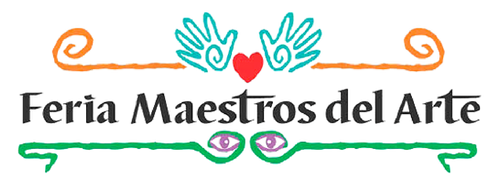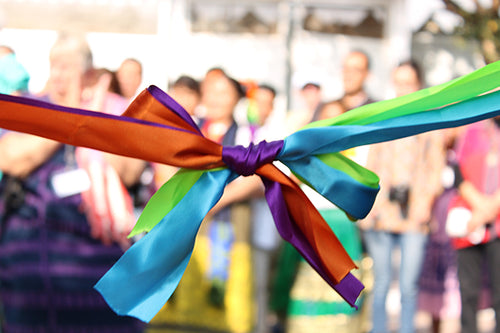
Eloisa Vargas and Luisa Alcantar Moncada, Zirahuen, Michoacán
Eloisa Vargas, recently widowed, is the elder of the Zirahuen, Michoacan artisan community. For the past six years, she has been the President of the local artisans' group. However, she has spent more than 55 years making and selling dolls, toys and other creations.
Her parents worked with wood and made figures of animals, toys, etc. Eloisa continued with this tradition, but added cloth dolls with tiny cross-stitched blouses and other details that reflect the local indigenous group of the Purépecha. She also worked on finding a way to animate the dolls by adding strings that go through a hole in the wood stand of the doll so that the string can be pulled to make an "action doll".
From there, she began to make rural scenes with dolls, wood and other items from her natural surroundings in the small town of Zirahuen. Eloisa laments that some toys are no longer made as they just don't have an audience anymore. She states it is getting more and more difficult to sell her simple handmade dolls as the modern world of electronic games and factory dolls have continued to increase in popularity. However, she has always encouraged her children to work creatively and some of them continue to assist her in producing the dolls and "scenes" of typical, rural life in Michoacan.
Some of the "scenes" include award-winning small rustic kitchens with cloth dolls. Other examples of the "scenes" are bull riding rings, greased pole games from years gone by and dancing old men that are typical of the traditional Michoacan ballet folkloric dance. All have multiple strings below their platforms so that one can make the scenes move.
The family also makes small wooden carts filled with what appears to be freshly picked corn or cut wood. Other toys made reflect rural life. She uses her personal history as her inspiration. For example, she reflects on the way her family used to farm and so developed the horse or donkey-drawn carts. Eloisa has had plenty of help as she has 10 children and as she says, too many to count grandchildren. She also has four great-grandchildren.
In addition to teaching her immediate family members, Eloisa has taught, Luisa, her niece, to follow the tradition of toy making - they are an inseparable team. Luisa Alcantar Moncada and her husband make award-winning interactive wooden toys that also reflect the rural life of Michoacan. They particularly like to make small wooden fishing boats with cloth fisherman. Zirahuen is a lakeside community that continues to have fisherman who use old dugout canoes to fish daily. Thus, the small wooden canoes reflect these long-held traditions.
Luisa's grandfather and father made wooden spoons and other carved objects. Her mother embroidered and worked with textiles. Luisa spent her early adult years as a wife and mother of 12 children. However, when persuaded to try something new about 40 years ago, she took up her mother’s tradition of working with textiles while her husband followed in the footsteps of his father-in-law and grandfather-in-law working with wood. The two have worked together ever since and Luisa makes small dolls and her husband creates the wooden part of the toys.
Luisa has 10 surviving children, 14 grandchildren and 1 grandchild. Eloisa or "Tía" and Luisa are the focal point of their family's work. It is because of them that the tradition of this type of doll and rural scenes continue to be made in Zirahuen.
In addition to "concursos" or contests sponsored by the government, they sell some of their work in Quiroga, a town in Michoacan that has many shops that resell a variety of crafts. However, with the influx of low-cost copied items from China, they can no longer make the more detailed and fine work except when they receive a private order. They are thrilled to have the opportunity to come to Feria Maestros del Arte and return to their roots to make the more finely detailed dolls and toys of the past.
In addition, they continue to make other handmade embroidered and cross-stitched items such as table runners and tablecloths. The men of the family also continue to make traditional carved wooden spoons and bowls.
The tradition is not to paint their work, and, in fact, they are disqualified from the government "concursos” if they do use paint, but they said they might paint parts of a few of the wooden items as they do like to add color at times as well. Eloisa and Luisa have traveled to a variety of fairs and exhibitions in many states throughout Mexico. In addition, they have both won 1st and 2nd place awards from FONART, in Uruapan, Paracho, Zirahuen and concursos sponsored by other organizations.
They do not use sewing machines or electric carpentry tools of any kind in their work. Their work is rustic and simple, yet lovely in its ability to reflect the indigenous life of Mexico both today and of days gone by.
The Michoacán Artist Coordinator for the Feria, Terry Baumgart, has three of the small dolls with strings that make them move. She purchased them about 35-40 years ago. At the time, she thought they were from Patzcuaro. A close friend from Morelia has told her those were the dolls she played with as a child. It wasn't until Terry moved to Zirahuén that she discovered the dolls had been made in Zirahuen by an artisan who is now deceased.
Zirahuen, Michoacán
Daughter Yolanda 434 116 3016

